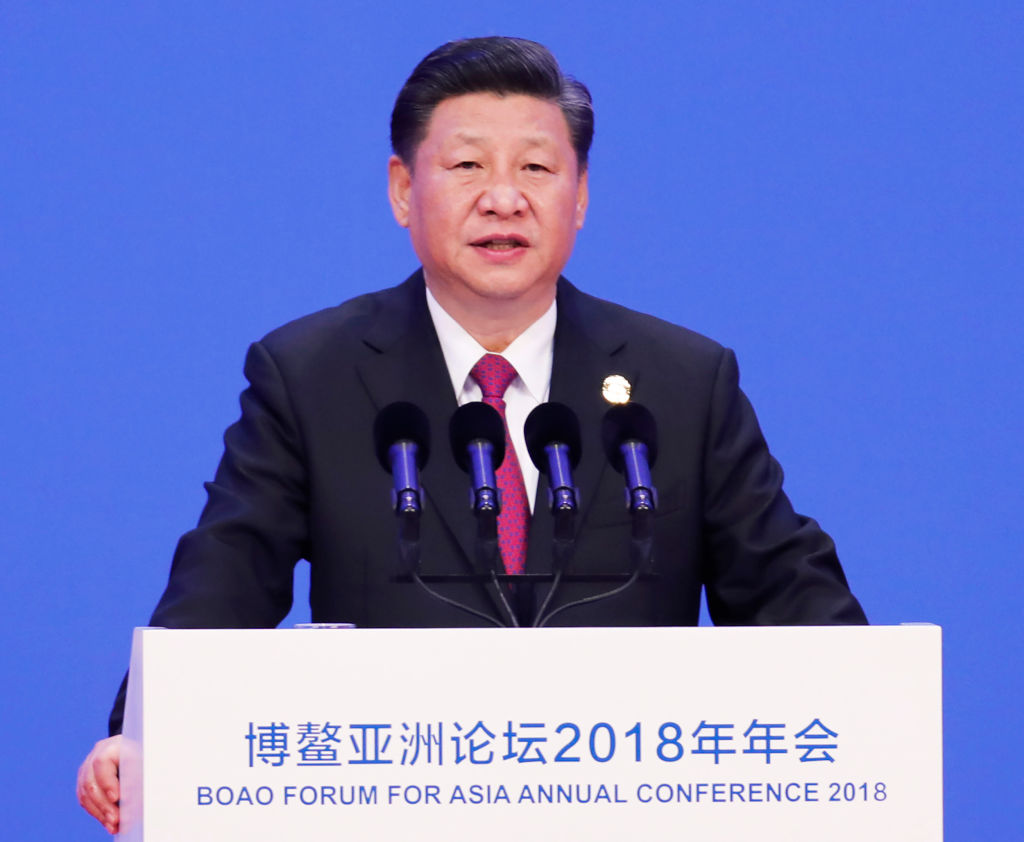Chinese President Xi pledges to lower auto tariffs, open other markets, in possible olive branch to U.S.


A free daily email with the biggest news stories of the day – and the best features from TheWeek.com
You are now subscribed
Your newsletter sign-up was successful
At a business conference in Hainan, China, on Tuesday, Chinese President Xi Jinping said that sometime this year, China "will considerably reduce auto import tariffs" and "import tariffs on some other products," and ease restrictions on foreign ownership in the auto industry "as soon as possible." Xi also addressed complaints about China stealing intellectual property from foreign companies, saying he will encourage "normal technological exchange" and strive to "protect the lawful ownership rights of foreign enterprises." Financial analysts said that the pledges, even without time frames or other details, could be an olive branch from Xi to President Trump to calm a brewing trade war between the countries.
Xi did not mention the U.S. or Trump in his 40 minute speech at the Boao Forum for Asia, and he focused mainly on his vision for China's economic development and role in the world. But he did address some irritants Trump has singled out regarding China, like the trade deficit. "China does not seek a trade surplus," Xi said. "We have a genuine desire to increase imports and achieve a greater balance of international payments." And he insisted that China "will not bully our neighbors," adding that "Cold War thinking and zero-sum games are increasingly obsolete. ... Arrogance or self-righteousness can only bump into walls at every turn."
China has made similar freer-trade promises before — Bejing has pledged to ease China's 50 percent limit on foreign joint ventures in the auto sector since at least 2013, for example, Reuters notes. So foreign business groups welcomed the promises cautiously. "Ultimately, U.S. industry will be looking for implementation of long-stalled economic reforms, but actions to date have greatly undermined the optimism of the U.S. business community," said Jake Parker, the vice president for China of the U.S.-China Business Council. Still, the idea that Xi's comments might avert a ruinous trade war sent stocks higher in Asia and boosted U.S. stock futures and the U.S. dollar.
The Week
Escape your echo chamber. Get the facts behind the news, plus analysis from multiple perspectives.

Sign up for The Week's Free Newsletters
From our morning news briefing to a weekly Good News Newsletter, get the best of The Week delivered directly to your inbox.
From our morning news briefing to a weekly Good News Newsletter, get the best of The Week delivered directly to your inbox.
A free daily email with the biggest news stories of the day – and the best features from TheWeek.com
Peter has worked as a news and culture writer and editor at The Week since the site's launch in 2008. He covers politics, world affairs, religion and cultural currents. His journalism career began as a copy editor at a financial newswire and has included editorial positions at The New York Times Magazine, Facts on File, and Oregon State University.
-
 How the FCC’s ‘equal time’ rule works
How the FCC’s ‘equal time’ rule worksIn the Spotlight The law is at the heart of the Colbert-CBS conflict
-
 What is the endgame in the DHS shutdown?
What is the endgame in the DHS shutdown?Today’s Big Question Democrats want to rein in ICE’s immigration crackdown
-
 ‘Poor time management isn’t just an inconvenience’
‘Poor time management isn’t just an inconvenience’Instant Opinion Opinion, comment and editorials of the day
-
 TikTok secures deal to remain in US
TikTok secures deal to remain in USSpeed Read ByteDance will form a US version of the popular video-sharing platform
-
 Unemployment rate ticks up amid fall job losses
Unemployment rate ticks up amid fall job lossesSpeed Read Data released by the Commerce Department indicates ‘one of the weakest American labor markets in years’
-
 US mints final penny after 232-year run
US mints final penny after 232-year runSpeed Read Production of the one-cent coin has ended
-
 Warner Bros. explores sale amid Paramount bids
Warner Bros. explores sale amid Paramount bidsSpeed Read The media giant, home to HBO and DC Studios, has received interest from multiple buying parties
-
 Gold tops $4K per ounce, signaling financial unease
Gold tops $4K per ounce, signaling financial uneaseSpeed Read Investors are worried about President Donald Trump’s trade war
-
 Electronic Arts to go private in record $55B deal
Electronic Arts to go private in record $55B dealspeed read The video game giant is behind ‘The Sims’ and ‘Madden NFL’
-
 New York court tosses Trump's $500M fraud fine
New York court tosses Trump's $500M fraud fineSpeed Read A divided appeals court threw out a hefty penalty against President Trump for fraudulently inflating his wealth
-
 Trump said to seek government stake in Intel
Trump said to seek government stake in IntelSpeed Read The president and Intel CEO Lip-Bu Tan reportedly discussed the proposal at a recent meeting
